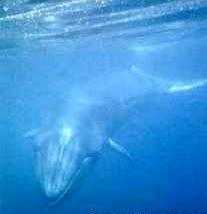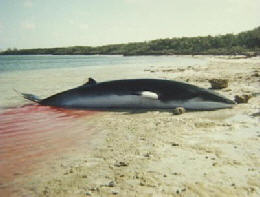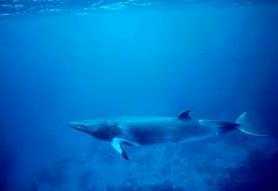|
SANTIAGO, Chile,
November 8, 2002 (ENS)
Countries in favor of conserving minke whales and Bryde's whales won two votes at the meeting of Parties to the UN Convention on International Trade in Endangered Species (CITES) today, turning down proposals by Japan to transfer these two species to a lower level of protection under the treaty.
The delegates from 160 countries voted to keep Bryde's and minke whales listed on the convention's Appendix I, ensuring that they can not be traded internationally. Japan had proposed to list them on CITES Appendix II, which would allow closely regulated international trade.
The minke whale proposal received 41 votes in favor, 54 votes against, five abstentions, and six spoiled votes.
The Bryde's (pronounced Broo-dahs) whale proposal received 43 votes in favor, 63 against, three abstentions, and two spoiled votes. Both votes lacked the two-thirds majority required to approve the proposal.
The Parties must accept these results in the meeting's plenary session late next week before they will become final.
Benin, Cuba, Dominica, Greenland, Grenada, Cote Ivoire, Senegal and Zimbabwe voted with Japan, on the basis that the whale stocks are abundant and whaling supports the livelihoods of poor coastal populations.
Canada, Chile, the European Union, Georgia, Mexico, India, Israel, the United States and the International Environmental Law Project, among others, opposed Japan's proposals, on the basis that a lowered level of protection would cause enforcement problems. Australia pointed to problems in distinguishing robust from endangered whale stocks.
Conservationist groups, including the International Fund for Animal Welfare (IFAW), are optimistic that the votes' results will carry through the plenary session, and ensure that international trade of whale products will not be allowed.
Still, they remained alert to the potential for a Japan stronghold on several small island nations and vote swapping with Southern African pro-ivory trade nations that could swing the votes in the final decision phase.
"We are pleased that Parties to CITES stood firm on the conservation of these whale species," said Vassili Papastavrou, IFAW whale expert, and member of IFAW's delegation to the CITES meeting in Santiago.
"Japan did not manage to reach a simple majority on either vote, showing clearly that the world does not support commercial whaling," said Papastavrou. "We need to ensure that Parties remain strong and do not allow these results to be reversed next week. It would be disasterous for whales, as it would bring Japan another step closer to realizing its goal of re-opening the global whale trade."
Japan's position on whaling as advanced by the Ministry of Fisheries is that, there are more than 10 million whales throughout the world and they eat too much of the fish that humans should be consuming.
"The quantity of marine living resources they consume is estimated to be some 180 million tons a year in the Antarctic alone and 500 million tons in all the oceans of the world combined. This represents approximately five times as much as the total of the resources now being harvested by the world's marine fisheries - 90 million tons," the Japanese Ministry of Fisheries says.
For the last four CITES meetings, held at 30 month intervals, Japan has submitted proposals to downlist certain species of whales. At each of these meetings, the Japanese proposals have failed.
A majority of the CITES Parties, along with the CITES Secretariat, stated that Japan's proposals undermined the International Whaling Commission (IWC), the international body charged with the responsibility to conserve whale species. An ongoing global IWC ban on commercial whaling has been in force since 1986.
"Japan was unable to circumvent the IWC whaling moratorium by playing one Convention off another," said Kitty Block, international lawyer for the Humane Society of the United States.
Today, across the Pacific Ocean from the CITES conference, the Japanese whaling fleet set sail for Antarctic waters.
"Today was a great victory for the whales," said Block. "However, it is ironic that on the very day the CITES Parties refused to allow Japan to kill whales and trade in their meat, Japanese whaling ships began a five month expedition to kill 400 minke whales in Antarctic waters."
Japan circumvents the ban on commercial whaling by conducting it under the scientific research provisions of the International Whaling Commission. The meat from the slaughtered whales ends up as food in sushi shops and markets because the IWC rules require that the whales taken for research be utilized rather than discarded.
The whaling issue will next be debated on an international level at the June 2003 meeting of the International Whaling Commission, in Berlin, Germany.
The 12th Conference of Parties to the CITES Convention opened November 3 and continues through November 15.
|


